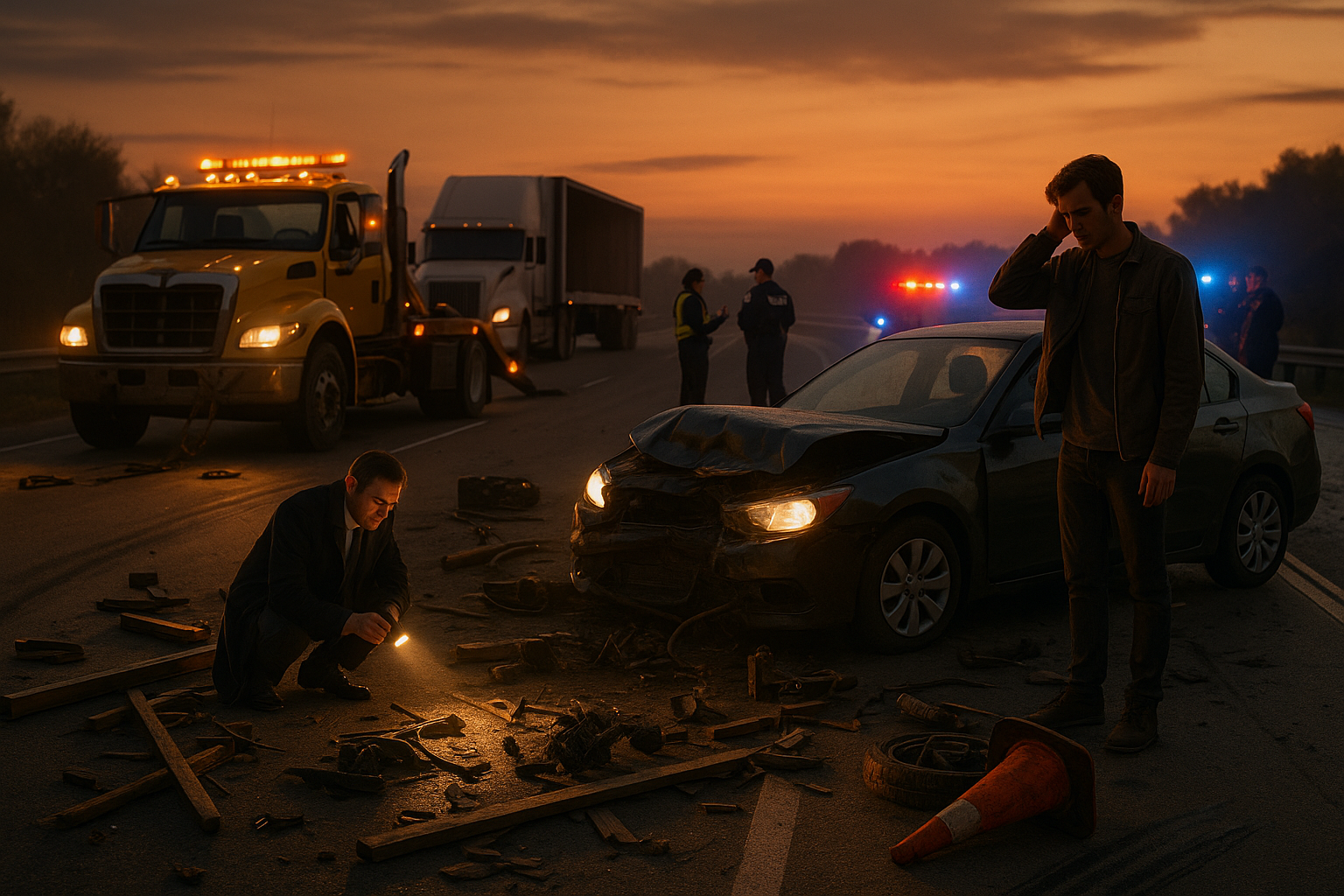Table of Contents

Estimated reading time: 20 minutes
Car Accidents While Working in California: Rights & CompensationKey Takeaways
- Know your rights: Understand the differences between workers’ compensation and personal injury claims.
- Report accidents immediately: Timely reporting is crucial for maintaining eligibility.
- Delivery drivers face unique challenges: Employment classification greatly impacts coverage and claims.
- Legal consultation is critical: Complex claims and overlapping insurance require expert guidance.
- Document everything: Medical records, photos, and witness info strengthen your case.
Work-related vehicle accidents are a growing hazard for many employees—and if you’ve experienced a car accident while working California, you’re not alone. With nearly 500,000 reported traffic collisions and over 250,000 injuries every year in the state, workplace crashes have become a major concern, especially as more job roles require regular driving or travel (California Car Accident Statistics).
Understanding your rights and legal options after a workers compensation car crash or on the job accident personal injury is crucial. Navigating insurance, complex workers’ comp processes, and potential personal injury lawsuits (Learn more here) is intimidating—but it’s essential for ensuring you receive complete protection and compensation.
In this detailed guide, we break down:
- What counts as a company vehicle accident in California,
- The differences between workers’ compensation car crash claims and personal injury lawsuits,
- Special considerations for delivery drivers and gig workers,
- And step-by-step instructions for safeguarding your rights.
Let’s clarify your best legal options company vehicle accident situations and help you maximize every avenue for your recovery.
Overview of Work-Related Car Accidents in California
What Is a Car Accident While Working California?
A car accident while working California is any vehicle collision that occurs while you’re performing job duties, including:
- Making deliveries as a courier or working for an app,
- Traveling between job sites in a company vehicle,
- Running errands at your employer’s request,
- Transporting clients or customers.
Common examples include:
- Delivery driver injured in crash while en route to a customer,
- Field sales representatives driving to meetings,
- Maintenance staff shuttling between client locations.
These situations differ from normal commuting—accidents generally must occur while carrying out active job tasks to qualify as “on the job accident personal injury” events and trigger related legal protections.
Why Are Work-Related Vehicle Crashes So Common in California?
- High Traffic Volume: California’s roadways are among the nation’s busiest, leading to higher risk.
- Prevalence of Delivery & Gig Work: More employees (and contractors) now spend extended time on the road.
- Scope of Job Duties: Many occupations now require use of personal or company vehicles as part of routine work.
California reports approximately 500,000 car crashes annually, causing more than 250,000 injuries and 3,600 fatalities each year (source). Delivery drivers, rideshare operators, and service professionals are particularly vulnerable, and accidents while working are a leading cause of workplace injuries—a trend made worse by the expansion of e-commerce and gig economy platforms.
See related data: California Car Accident Statistics, Work Zone Crash Facts
Key Takeaway: If you are involved in a work-related vehicle collision, you have important rights under both workers’ compensation and personal injury law. Understanding these rights is fundamental for protecting your health and your financial future.
Workers’ Compensation Car Crash: Navigating Job Injury Benefits
What Is Workers’ Compensation for Car Accidents?
In California, a workers compensation car crash refers to any on-the-job auto accident that entitles you to workers’ compensation benefits. These no-fault benefits cover:
- Approved medical expenses,
- Partial wage replacement for missed work,
- Certain disability payments,
- Supplemental job displacement benefits if you cannot return to your old job.
Key Eligibility Points:
- The accident must happen while performing job tasks, not just regular commuting (exceptions for those whose typical work IS travel).
- Immediate reporting of the crash and resulting injuries to your employer is required for a valid claim.
- Delivery driver injured in crash status depends on employment classification (employee vs. independent contractor).
Process for Filing a Workers’ Compensation Claim:
- Report the accident right away to your employer, with full details of what happened and any injuries.
- Seek medical care as soon as possible; see an employer-approved provider if required.
- Complete and submit a workers’ compensation claim form (DWC-1) with your employer.
What Does Workers’ Comp Cover?
- All reasonable, necessary medical care related to the injury until you recover or reach “maximum medical improvement.”
- Temporary or permanent disability payments based on your inability to work.
- A supplemental job displacement voucher if you cannot return to your role because of injury.
What Is NOT Covered?
- Pain and suffering is never compensated through workers’ compensation.
- Workers’ comp usually won’t replace your full wages. There are statutory limits to weekly payments.
Special Notes for Delivery Drivers:
- Employee vs. Independent Contractor: Only employees are automatically covered. Misclassification disputes (common in delivery companies and gig economy jobs) can threaten your coverage.
- Delivery driver injured in crash cases are especially complex when companies dispute employment status or deny coverage.
Bottom line: Workers’ compensation is designed to provide immediate relief, but claims can be denied or undervalued, and workers’ comp is just one potential compensation path after a company vehicle accident.
Personal Injury Claims vs. Workers Compensation for Job-Related Car Accidents
On the Job Accident Personal Injury vs. Workers’ Comp: What’s the Difference?
- A workers’ compensation car crash claim is an insurance benefit from your employer covering medical bills, wage replacement, and rehabilitation.
- An on the job accident personal injury claim is a lawsuit or civil claim against a third party (not your employer) whose negligence contributed to your crash.
When Can You File a Personal Injury Lawsuit?
- Faulted by another driver: If another motorist’s negligence caused the car accident while working California, you may sue them for damages.
- Defective vehicles/parts: If a mechanical failure or auto defect played a role, claims can be made against manufacturers.
- Unsafe roads: If poor road conditions (construction, lack of signs, hazards) are involved, governmental agencies can sometimes be liable.
Why Choose a Personal Injury Claim?
Unlike workers’ comp, personal injury lawsuits allow broader recoveries:
- Full wage loss (not subject to workers comp caps)
- Pain and suffering
- Punitive damages (in rare, egregious circumstances)
- Future medical bills and comprehensive loss of earning capacity
Coordinating Both Claims: Subrogation and Complexity
- California often allows you to pursue both workers’ comp and personal injury claims together if a third party is at fault.
- However, your workers’ comp insurer can “subrogate”—they may seek reimbursement from any personal injury recovery you win. This requires careful case management.
Standards of Proof and Damages:
- Workers’ comp: No need to prove fault, benefits are statutory and limited.
- Personal injury: Must prove third-party fault (negligence). Damages can be far higher, but require evidence and legal action.
Key Risks:
- Filing errors, missed deadlines, or poor claim coordination can reduce your total recovery.
- Overlapping claims require detailed documentation, coordination between legal and medical professionals, and careful navigation of California’s legal system.
For more, see: Step-by-Step Guide: How to File a Personal Injury Claim
Special Issues for Delivery Drivers Injured in Crash Situations
Why Are Delivery Drivers at Extra Risk?
Delivery driver injured in crash cases are especially common—and complicated—because:
- Drivers spend extended hours on the road, often under tight deadlines,
- High exposure to traffic increases accident risks,
- Frequent stops, navigation in unfamiliar areas, and time pressures all contribute.
Employee vs. Independent Contractor: A Legal Battleground
- If you’re misclassified as an independent contractor, you could be denied workers’ comp benefits even if you’re functionally an employee.
- California Assembly Bill 5 (AB5) and subsequent court battles have sought to clarify/grow employee status among gig workers, but many delivery company practices remain in legal gray areas.
Insurance Policies for Delivery Drivers
- Company-provided auto insurance: Some delivery platforms (like major package services) carry policies that may cover injuries or liabilities while you’re working.
- These company policies often have:
- Strict eligibility and coverage limits,
- Exclusions if a driver was violating policy (e.g., off-duty, not logged into app),
- Disputes over “course and scope” of employment.
What Challenges Do Delivery Drivers Face?
- Disputes over whether the injury happened during work or in personal time,
- Employer/insurer attempts to deny responsibility based on job classification,
- Coordination of multiple policies (your own, third party, company),
- Difficulty securing full compensation for lost work, medical costs, and pain and suffering.
Risk Data and Industry Trends:
- The increase in gig economy and logistics workers correlates with a significant rise in job-related vehicle injuries (source).
- Many drivers are confused or unaware about their actual legal/insurance rights after an on the job accident personal injury.
If you’ve been injured while using an app-based platform, see our guide on handling Rideshare accidents: How to Handle a Rideshare Accident.
Critical Advice: If you are a delivery driver injured in crash, do not accept an initial denial or “independent contractor” label without a fight—your employment status and claim eligibility might be much stronger than your company admits.
Legal Options Company Vehicle Accident: What Can Injured Workers Do?
Understanding Your Legal Options After a Company Vehicle Crash
If you are injured in a company vehicle accident, your legal options include:
1. File a Workers’ Compensation Car Crash Claim
- This is the first and primary step for employees.
- Workers’ comp covers approved medical bills, partial wage replacement, and rehabilitation expenses.
- No need to prove fault—benefits are payable as long as the injury was job-related.
2. File a Personal Injury or Third-Party Lawsuit
- If another party (e.g., at-fault driver, negligent mechanic, or vehicle part manufacturer) contributed to your accident, you may file a civil claim against them.
- These claims are potentially worth far more than workers’ comp alone, especially for:
- Pain and suffering,
- Full wage loss and reduced earning capacity,
- Long-term disability or disfigurement.
Determining who is at fault and which policies apply can be very complex. For a detailed overview, see Navigating Your Legal Rights After an Auto Accident.
3. Parallel Claims: Coordination Required
- In some cases, both claims proceed together. Workers comp covers immediate needs; a successful personal injury claim may provide further compensation.
- Careful coordination is essential to prevent claim conflicts and maximize recovery.
Can You Sue Your Employer After a Company Vehicle Accident?
- Usually NO. Workers’ compensation is the “exclusive remedy” for workplace injuries in California.
- You may only sue your employer directly if:
- The employer engaged in intentional misconduct,
- There is evidence of gross, egregious negligence (rare).
The Role of Insurance in Company Vehicle Accidents
- Company vehicle insurance: This often provides primary coverage, but may have coverage gaps or limits.
- Other involved insurers: If another party was involved, their auto liability insurer could also share responsibility.
- Overlapping policies and disputes between insurers are common.
Why Legal Consultation Is Critical
- Determining who is at fault and which policies apply can be very complex.
- Consulting an attorney ensures that all compensation options are pursued—from company policies to third-party damages and beyond.
Bottom Line: Every case is unique; the right legal option depends on fault, the role of the company or vendors, and the details of insurance policy language.
Practical Steps to Take After a Car Accident While Working California
Step-by-Step Checklist for Employees
If you’re involved in a car accident while working California, protect your rights and set the stage for claim success with the following steps:
1. Report the Accident Immediately
- Notify your employer right away—verbal notice should be followed by written documentation.
- Delayed reporting can jeopardize your claim under both workers’ comp and personal injury law.
2. Seek Medical Attention Promptly
- See a doctor immediately, even for seemingly minor injuries.
- Use an employer-approved medical provider if required.
- Request detailed medical documentation for every injury and related visit—this is pivotal evidence.
Additional statistics, source: Sigelman & Associates, California Car Accident Data
3. Document All Details of the Accident
- Take photos of the vehicles, the accident scene, and your injuries.
- Gather names and contact information from all witnesses.
- Request a police or incident report and keep a copy.
- Maintain a personal incident diary, noting all symptoms and developments.
4. Notify Insurers and Initiate Claims
- Contact your employer’s insurance right away.
- If applicable, notify other insurers involved (company fleet, third-party vehicles, etc.).
- Keep records of all correspondence regarding claims.
- For a comprehensive walkthrough, see Navigate the Auto Accident Claim Process With Confidence.
5. Consult a Qualified Attorney as Soon as Possible
Especially for complex cases—such as delivery driver injured in crash or those involving a combination of workers compensation car crash and on the job accident personal injury:
- An attorney ensures you:
- Meet all deadlines and legal requirements,
- Verify employment status and proper insurance coverage,
- Maximize recovery by coordinating all available claims.
6. Track All Injury-Related Expenses
- Collect receipts for every medical bill, pharmacy visit, therapy session, or replacement service.
- This documentation is required for both workers’ comp and personal injury claims.
7. Understand Legal Deadlines and Statutes
- Workers’ compensation: Immediate notification and tight deadlines apply (generally within 30 days of injury).
- Personal injury lawsuits: California’s statute of limitations is usually two years from the date of the accident; missing this prevents you from recovering damages.
8. Follow Up Religiously
- Keep in regular contact with your employer, insurers, healthcare providers, and your attorney.
- Maintain copies of all documents and logs of conversations.
Special Note: Dual-claim scenarios (pursuing both workers’ comp and personal injury) are uniquely complex—expert legal counsel is highly recommended to avoid costly errors.
Conclusion: Protect Your Rights After a Car Accident While Working California
A car accident while working California is among the most common and financially severe workplace injuries. As annual crash rates and job-related driving rise, more workers are finding themselves in need of support after a workers compensation car crash or on the job accident personal injury.
Understanding the distinction and interplay between workers’ comp benefits and personal injury lawsuits is crucial. Each path offers different types—and amounts—of recovery. Navigating overlapping insurance, employment status disputes, and California’s legal requirements makes these cases inherently complex.
Knowing your legal options company vehicle accident aftermath is the best way to ensure a full financial and medical recovery. From reporting the crash to managing competing insurance claims, being proactive and informed at each stage pays dividends.
But the single most important step is to get qualified legal advice tailored to your unique situation. An experienced attorney can maximize your recovery by coordinating all available benefits and standing up to insurers, employers, or negligent third parties.
Call to Action: Get a Free and Instant Review of Your Case
If you’ve been in a car accident while working California—whether as a delivery driver, company employee, or gig worker—don’t leave your rights to chance. Discover your eligibility for a workers compensation car crash claim, explore all available legal options company vehicle accident situations, and find out if your case qualifies for further on the job accident personal injury compensation within 30 seconds.
Contact Visionary Law Group today for a fast, free legal case evaluation.
➜ See if your case qualifies instantly at:https://eval.visionarylawgroup.com/auto-accident
Don’t settle for less than you deserve—get every dollar you’re owed.
References
This article is intended for informational purposes only and does not constitute legal advice. For specific questions about your rights or workers’ compensation status, always consult with a qualified attorney.
FAQ
What should I do immediately after a car accident while working in California?
Report the accident to your employer immediately, seek medical care promptly, document all details of the accident, notify insurers, and consult a qualified attorney as soon as possible.
Am I eligible for workers’ compensation if I am an independent contractor?
Generally, only employees are automatically covered under workers’ compensation. Independent contractors may be excluded, but this can be legally contested depending on your actual employment status.
Can I sue my employer for a car accident that happened while working?
Usually no, as workers’ compensation is the exclusive remedy in California. Exceptions exist only in cases of intentional misconduct or gross negligence by the employer.
What damages can I recover in a personal injury lawsuit that are not available under workers’ comp?
Personal injury claims can provide compensation for pain and suffering, full wage loss, punitive damages in rare cases, and future medical expenses — benefits typically not covered by workers’ compensation.
How can I maximize my compensation after a work-related car accident?
By reporting the accident quickly, following medical advice, thoroughly documenting the incident, filing both workers’ compensation and personal injury claims if applicable, and consulting a qualified attorney to coordinate your claims.



